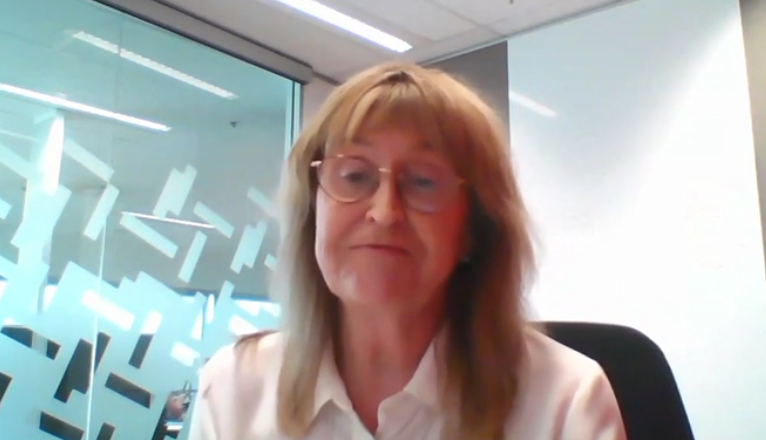State borders may have become more defined in the wake of COVID-19, but the inverse has occurred among the state screen agencies, who presented a united front at this week’s Australian International Documentary Conference (AIDC).
Film Victoria CEO Caroline Pitcher; Screen Territory director Jennie Hughes; Screen NSW head Grainne Brunsdon; South Australian Film Corporation (SAFC) CEO Kate Croser, Screenwest documentary manager Paul Williams; Screen Queensland CEO Kylie Munnich, and Screen Tasmania executive manager Alex Sangston joined moderator and head of drama at Sweetshop & Green, Ester Harding, on Tuesday for a wide-reaching discussion on the issues facing the industry at a national and state level.
The pandemic has reportedly strengthened the communication between the state bodies, which now come together every fortnight to discuss the challenges resulting from the altered climate.
Sangston said it was important for the industry to know how much the agencies talked to one another.
“If anyone has any ideas or thoughts about the ways in which we can work together, please let us know because we have each others phone numbers and we are always on Zoom calls with each other,” he said.
Uptick in applications
Many of the the states report an increase in applications for feature-length documentaries ahead of the proposed ‘harmonisation’ of the Producer Offset for film and TV at 30 per cent from July.
While Pitcher acknowledged filmmakers want to take advantage of the 40 per cent film offset while it remains, she said there has been a “general uplift” in feature docs even prior to the announcement of the changes.
“A big question for us is how do we support documentary filmmakers to sustain that success, even through significant policy change,” she said.
While Brunsdon has seen a trend towards larger budgets, she remains concerned about the QAPE threshold being raised from $500,000 to $1 million.
“A number of [documentary films] across the past year have budgets in excess of $1.5 million and have had great success at the box office,” she said.
“There is a big festival audience for feature documentaries that is only growing, so we are really heartened by that.
“But this about looking at the 48 per cent of feature docs that had budgets below $1 million, which is something that is certainly a concern for the sector.”

Both Williams and Sangston identified that regulatory changes had impacted the nature of applications they were receiving, many of which did not carry a specified format. For instance, projects come in that could work as “90 minutes or 4 x 30”.
“We’re seeing an each-way bet in terms of format in Western Australia,” Williams said.
“Several projects that were naturally conceived as standalone features have been reformatted because producers don’t believe they will be able to finance them under the new model.”
SAFC is consulting with producers to examine if there were any business opportunities that could arise from the reforms.
“We’ve had a terrific run with documentaries across the past couple of years in South Australia,” said Croser.
“Looking back, the television or streaming one-offs or series we have supported would largely outweigh the feature documentary projects.
“In that sense, we’re working with producers to look at the changes happening through this disruption that could lead to business opportunities, including potentially more market partners to open up to.”
For Munnich, a key priority is to make sure projects can find an audience.
“I worry not only about the regulatory changes, but also the issue with cinemas and people’s ability to go to the cinema and trust the cinema during COVID.
“Independent cinemas are struggling so we really need to ensure that, if we as a state agency are funding these projects through development or investment, there is a path to audience, whether that be through streamers, cinemas, or festivals.”
Regulatory changes may have “long-term creative impact”
One of the Federal Government’s proposed changes to the Producer Offset is the removal of the Gallipoli clause, which allows producers to claim some offshore costs as QAPE.
WIlliams suggested it may be up to state agencies to “pick up the bill”, predicting a potential “long-term creative impact” of the move on the documentary sector. He cited the example of SBS/Artemis Media documentary series Every Family Has a Secret, which follows Australians as they confront their ancestry – a journey that sometimes takes them to different parts of the world.
“Projects like that where there is a narrative drive to film overseas might be jettisoned if those kind of costs can’t be claimed,” he said.
But Sangston said it may also have the effect of pushing producers into formal co-production arrangements to unlock financing from other markets, allowing the state agencies to push forward with projects that re-inject funds into their respective jurisdictions.
“The economic benefit argument is even more important now because everybody is desperate for economic recovery,” he said.
“That’s the game we’re all in now.”

His sentiments were shared by Hughes, who said the amount of money that was being put back into the Northern Territory had become a “big focus” for Screen Territory.
“Every time we are going out there, it’s always about, ‘What’s the NT spend?’,” she said.
“It’s jobs and goods and services, and what benefits there are for our territory.”
Pitcher agreed but said it was also important for state agencies to recognise the cultural value of factual and documentary projects.
“Whilst they may not be delivering the big economic returns, we see [documentary and factual films] as being incredibly valuable because we want Australians to see themselves in these stories, learn from them, and to go out and have conversations in their communities about the topics that are affecting the world,” she said.
“The pressure is on us to deliver economic recovery but we strongly acknowledge the importance of cultural value, particularly of factual and documentary.
Supporting the industry
Despite the challenges of the last 12 months, Croser believes producers and filmmakers should not feel constricted by the post-COVID climate.
“Producers and filmmakers are an entrepreneurial bunch – they will adapt to the conditions of the market and the landscape,” she said.
“That’s something we are putting a lot of focus on at SAFC, where the main aim of our strategy is to enable entrepreneurship.
“We really want producers to come to us with the business and revenue models.
“We don’t to prescriptive about what people should be doing; we want people to be really ambitious and creative.”
Pitcher also said that Film Victoria did not want to create too many boundaries and restrictions around its requirements for funding.
“We have to [create boundaries] in terms of expending taxpayers money and ensuring we have the right corporate governance around our programs of support,” she said.
“That said, for us to innovate solutions for the industry is the wrong way round.
“We would love to hear some of the ways the industry is collaborating to come up with ideas that rise above some of these policy boundaries.”


